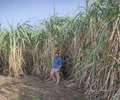
Burhanpur in Madhya Pradesh is a notable banana-growing region, with about 16,000 hectares of land dedicated entirely to the production of the fruit. The local farmers generally hire additional labor to remove the stems and leaves of the banana trees from their fields before planting new crops. The leftover banana trash is then deposited in pits or another location and left to decompose.
But Mehul Shroff, an MBA graduate from the same area, was one who saw the potential in this supposed waste. He then made the decision to build a successful business through this waste.
"I have witnessed farmers in our region dumping the banana waste after the harvest since I was a young child. Before doing any research, I, too, was unaware of the immense potential it held as agricultural waste. In order to support farmers, I wanted to create a sustainable business,” he said.
Mehul's sustainable business, which was founded in 2018, turns banana stems into fiber that can be used to make paper, textiles, and other useful items. He now generates a yearly revenue of about Rs 30 lakh by selling three to five tonnes of banana fiber every month.
Banana Waste is More Than Just Waste
In 2016, Mehul completed his MBA and started working for his family's jewelry company. But he had always had a deep desire to launch his own business.
He started looking for a viable and ethical business concept in an attempt to achieve this goal. "That's when I first spoke with the Burhanpur District Magistrate. He advised me to start by considering what I can accomplish in my local region when I expressed my ambition to start a new business. In fact, because of this, I started looking for options in my area," the 20-year-old claimed.
Mehul also attended a session that the district government and Navsari Agricultural University organized in Burhanpur. He adds that it took him around two years of study to develop a solid business strategy. "In the workshop, they talked about how fibers can be generated from the banana stem and how it can be utilized in the textile, paper, and handicraft sectors."
"In spite of frequently being viewed as agriculture waste, I discovered from my research that banana stems contain significant amounts of cellulose and natural fiber. In order to create fibers that can be made into fabrics, they are the ideal input,” he said.
Mehul ensured that he fully understood the trade's details before launching his enterprise, including the dangers, difficulties, and market size. The ICAR-National Research Center for Banana, Tiruchirappalli, which is leading the charge in promoting banana fiber and its uses, also sponsored training, in which he took part. Moreover, he spoke with the Burhanpur farmers and presented his concept to them, gaining their support.
2018 witnessed the launch of Mehul's sustainable brand, Shroff Industries. He established a processing facility in Burhanpur and started buying banana stems from farmers around the area.
Waste Into Art
According to Mehul, finding a market for banana fiber was one of the biggest difficulties he faced.
"Despite being the world's largest producer of bananas, we haven't yet reached the crop's full potential. In this regard, awareness-raising is necessary, he claims.
“It was a little challenging to persuade those in the textile sector about the potential of banana fiber, even during marketing. They were reluctant to give anything new and organic a try. So, I offered him the fibers for even less than the profit margin. When the outcome was favorable, they were convinced.”
Eventually, he moved on to explore the potential for producing handicrafts from these fibers. He gave them to the rural women of Burhanpur to create different handicrafts.
"Training the craftsmen to make handicrafts was yet another issue because they were unfamiliar with the raw materials. Initially, I used to help them, but now I've hired a trainer to help them create handicrafts using banana fiber,” according to Mehul.
“We currently employ 40 or so women to produce handicrafts for us. Additionally, our processing unit employs 10 people,” he added.
These handicrafts include wall clocks, yoga mats, worship mats, ropes, bags, planters, baskets, and other items. The cost of these items ranges from Rs 100 to Rs 2,000, depending on their size and amount of work.
The firm had a low point in 2020 with the onset of the pandemic. "Sales decreased, and it was one of the most challenging times. We are on the road to recovery now that things have gotten better,” he said, adding that at the moment they generate three to five tonnes of fibers every month.
Fibers are a perfect alternative to handicrafts for creating paper. However, producing paper from banana fiber requires a lot of labor. So, we now provide the raw materials and outsource the processing labor," he continues.
Mehul claims to have also created liquid organic nutrition based on banana waste. "Navsari Agricultural University in Burhanpur tested this. Along with vital plant nutrients, the product also includes growth regulators and organisms that break down waste. It will help in enhancing soil fertility, which will raise productivity,” he added.
A helping hand to banana farmers
According to him, his initiative is a blessing for several banana producers in the region.
"We send our procurement staff to the field when a farmer notifies me when they need to clean the field post-harvest. They gather the agricultural waste from the fields, split it up, and bring it to our processing center. Mehul adds that at the moment, he obtains stems regularly from between 50 and 100 farmers in the area. " They can avoid the cost of the labor required to cut the stems and clear the field by doing this," he said.












